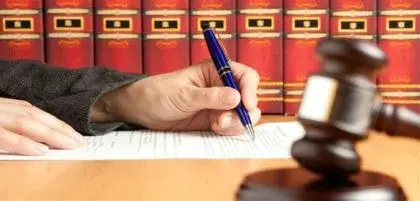Limitation Period in Commercial Suits for Filing Written Submission Starts from the First Date of Service
 The Hon’ble High Court of Delhi in a recent case NBCC (India) Ltd. v Aircon Engineering Services & Ors. has clarified that the period of limitation for filing written statement in a commercial suit starts from the date of first service and not from the date of second service provided that the report by the bailiff shows that the first service was successful.
The Hon’ble High Court of Delhi in a recent case NBCC (India) Ltd. v Aircon Engineering Services & Ors. has clarified that the period of limitation for filing written statement in a commercial suit starts from the date of first service and not from the date of second service provided that the report by the bailiff shows that the first service was successful.
Playing poker is legal- Calcutta High Court
 In the modern times gaming industry has gained rapid popularity, poker being one of the most favourite games. Being a subject matter of respective State jurisdictions, poker can only be legally played for real time money in restricted States throughout India.
In the modern times gaming industry has gained rapid popularity, poker being one of the most favourite games. Being a subject matter of respective State jurisdictions, poker can only be legally played for real time money in restricted States throughout India.
India: Delhi High Court orders removal of all posts defamatory to Ramdev ‘Globally’
 There has been a recent and peculiar development in the field of international jurisdiction for orders passed by Indian Courts. This development unfolded in the case of Swami Ramdev & Anr v. Facebook Inc. & Ors., in which a decision has been passed for removing defamatory content posted online without a geographical limit.
There has been a recent and peculiar development in the field of international jurisdiction for orders passed by Indian Courts. This development unfolded in the case of Swami Ramdev & Anr v. Facebook Inc. & Ors., in which a decision has been passed for removing defamatory content posted online without a geographical limit.
Gun Jumping in Mergers and Acquisitions
 Competition is regarded as one of the most useful means recognized globally to ensure that consumers are provided access to a wide range of goods and services at competitive prices and the producers have an incentive to innovate and reduce costs for meeting the demands of consumers. It would be correct to mention that competition promotes efficiency. Recognizing its importance, governments across the world promote and sustain competition in the markets through appropriate regulations.
Competition is regarded as one of the most useful means recognized globally to ensure that consumers are provided access to a wide range of goods and services at competitive prices and the producers have an incentive to innovate and reduce costs for meeting the demands of consumers. It would be correct to mention that competition promotes efficiency. Recognizing its importance, governments across the world promote and sustain competition in the markets through appropriate regulations.
Limitation Period in Commercial Suits for Filing Written Submission Starts from the First Date of Service

The Hon’ble High Court of Delhi in a recent case NBCC (India) Ltd. v Aircon Engineering Services & Ors.[1] has clarified that the period of limitation for filing written statement in a commercial suit starts from the date of first service and not from the date of second service provided that the report by the bailiff shows that the first service was successful.
The order dated September 3, 2019 was passed by Hon’ble Ms. Justice Mukta Gupta of the High Court of Delhi in an appeal against an order passed by the Joint Registrar closing the right of the appellant (Defendant in the trial court), to file the written statement due to delay of 120 days.
Appellant’s Contention
The case of the Appellant/Defendant was that they were served on August 22, 2017 and its counsel was asked to appear on August 24, 2017. The Counsel for the said Defendant appeared before the Joint Registrar, Delhi High Court but was served with the paper book again after a few days. But on September 09, 2017, the said Defendant claimed that a few papers were missing from the paper book. Hence, the complete paper book was again served upon him on October 27, 2017. Finally, the written statement was filed by the said Appellant/Defendant on January 30, 2018.
Due to this, the Petitioner contended that the period of limitation should start from the date the complete paper book was supplied to the Defendant i.e. October 27, 2017.
In their condonation of delay application, the Defendant had cited a delay of 64 days (counting the period of limitation from October 27, 2017).
Respondent’s reply
The Respondent (the Petitioner in the original suit) countered the claim of the Appellant/Defendant by pointing out that the first service was made on June 16, 2017, the date documented on the bailiff’s report, and the complete paper book was provided to the Appellant on September 27, 2017.
Even after excluding the period of 21 days, the extended period of 120 days for filing the written statement was over much before January 30, 2018.
The Appellant/Defendant argued that there was no service upon him on June 16, 2018 and that the period of limitation should commence only from October 27, 2017 when the complete paperbook was purportedly served on him.
Court’s Observation
The Appellate Bench, Hon’ble Delhi High Court comprising of Pratibha M. Singh rejected the Appellant’s plea for condonation of delay by noting that the Appellant very conveniently did not mention the fact about the date of first service on June 16, 2017 in their plea for condonation. Moreover, the report of the bailiff showed that the first date of service was June 16, 2017. Therefore, there was no material to show that the complete paper book was not supplied to the Appellant on the first date of service.
The Court also relied on the Division Bench judgement of the High Court of Delhi in Frank Anthony Public School v Smt. Amar Kaur[2],wherein it was held that the leave to defend starts from the date of first service and not the second service.
Therefore, the Court dismissed the appeal and upheld the order of the Joint Registrar which rejected the Appellant’s application for condonation of delay
[1] CS(COMM) 232/2017
[2] Civil Revision (R) Petition No. 580/1983
Playing poker is legal- Calcutta High Court

In the modern times gaming industry has gained rapid popularity, poker being one of the most favourite games. Being a subject matter of respective State jurisdictions, poker can only be legally played for real time money in restricted States throughout India.
The game of Poker
Poker is a card game which requires a player to strategize his/ her moves, exercise experience as well as alertness on the table and skills in calculating the probability. Some of the States namely Delhi, Karnataka, West Bengal, etc. identify poker as a game of skill and not as an act of gamble vide judgments from different courts as well as the local legislations. On the other hand, there are some States in India which do not allow the playing of poker for real time money such as Gujarat, Assam, Odisha, Telangana, etc.
Judicial standpoint of Calcutta High Court
The High Court of Calcutta (Circuit Bench at Jalpaiguri) vide its order [1] dated August 28, 2019, in the matter of Indian Poker Association & Anr. Vs. The State of West Bengal & Ors. has held that there could not be any occasion for the police to interfere in the operations of the Indian Poker Association who rented a room for its members to play the game of poker in a hotel.
In the case, the Petitioner association alleged that the Police Authorities had unnecessarily harassed the Petitioners on the false pretext that there was a legal bar on playing poker. The Petitioner’s also contended that in view of the definition of “gaming or gambling” under Section 2(1)(b) of the West Bengal Gambling and Prize Competitions Act, 1957, poker was not included either in gaming or gambling and, therefore, if anyone indulged in playing such game without indulging in any other overt act then the same did not attract police interference.
The Hon’ble Court in view of the fact and circumstances in the case, passed an order in favor of the Petitioners and held that the Indian Poker Association was not carrying out any illegal activity by offering the game of poker since it is ipso facto not included within the purview of the West Bengal Gambling and Prize Competitions Act, 1957.
Where the gaming industry is expanding its wings and poker being one of the most played and sought after game, this judgement reinforces its recognition as a legal activity.
[1] W.P.A. No. 394 of 2019
India: Delhi High Court orders removal of all posts defamatory to Ramdev ‘Globally’

There has been a recent and peculiar development in the field of international jurisdiction for orders passed by Indian Courts. This development unfolded in the case of Swami Ramdev & Anr v. Facebook Inc. & Ors., in which a decision has been passed for removing defamatory content posted online without a geographical limit.
The case was decided by the Hon’ble Delhi High Court, and held that as long as either the uploading of the content in question is uploaded from India or whether the information that is uploaded is located in India on a computer resource, then the Indian Courts are to have international jurisdiction to pass worldwide injunctions.
The juristic thought behind the judgement was that as long as the uploading of content from India has led to data or information creation in the networks then the same ought to be disabled or blocked by an order passed. To further clarify this the Hon’ble Court opined that, under Section 79 of the Information and Technology Act, 2000, the blocking or disabling of access has to happen at the computer resource which includes computer networks. The computer network on which this Section may apply, applies to the entire network and not a geographically limited network.
The Court further drew parallels with the disabling policies indulged by the platforms (such as Google, Facebook, Twitter) having a global reach and effect; stating that if their (the platforms’) polices are global in nature then there is no reason why Court orders passed by Indian Courts ought not to be global in its effect. The Hon’ble Court held that all the offending material i.e. the various defamatory remarks and information including videos, based on a book titled “Godman to Tycoon – the Untold Story of Baba Ramdev ” which has been uploaded from the country (India) on to the Defendants’ ‘computer resource’ or ‘computer network’ would have to be disabled and blocked on a global scale.
Further observations by the Court were made in this regard, such as, any information which is uploaded from India to a computer resource which led to the information to exist on the network and global dissemination of the same occurs, then the platforms would be liable to remove the information or disable the access to the said information. Such removal or disabling cannot be restricted to a geographical extent.
Potential Consequence:
For a long time extra territorial jurisdiction has been pondered upon and has restricted the application of national laws to the globally functioning platforms on the internet. This instance can be construed as a case of ‘right to be forgotten’, it is not a first of its kind case as it falls in line with many cases across the globe passed on the same legal parameters, such as the EU case which Google won recently. Although, it does not undermine the impact of this judgement as it is coupled with anti-defamatory legal provisions and not mere old information as in the EU-Google Case.
Gun Jumping in Mergers and Acquisitions

Competition is regarded as one of the most useful means recognized globally to ensure that consumers are provided access to a wide range of goods and services at competitive prices and the producers have an incentive to innovate and reduce costs for meeting the demands of consumers. It would be correct to mention that competition promotes efficiency. Recognizing its importance, governments across the world promote and sustain competition in the markets through appropriate regulations.
As per the provisions of the Competition Act 2002 there is a requirement for the implementation of a systematic approach for carrying on business in compliance with the fair rules of competition for the purpose of minimizing the risk of contravention of the applicable provisions of the legislation.
The Competition Act apart from prohibiting anti-competitive agreements and the abuse of dominant position, also mandates the Competition Commission of India (“CCI”) to regulate combinations (mergers and acquisitions) with a view to ensure that there is no adverse effect on the competition in India.
The merger control regime in India is suspensory in nature which means that the parties to a combination are not allowed to complete a transaction until and unless the CCI grants the formal approval for the same or before the passing of 210 days from the date of filing the notice with the CCI as prescribed under Section 43A of the Competition Act and no order is passed by the CCI during such period. Apart from the failure to notify such a proposed combination within the prescribed time frame, any act in furtherance of such a transaction, including sharing commercially critical data before such approval is granted, is likely to be seen as an instance of ‘gun jumping’ and may attract penalties under the Competition Act.
What is Gun-Jumping?
The Competition Act, 2002 does not render any specific definition to the term “gun-jumping” and the same has evolved as a concept through instances of violations of legal obligations by merging parties. The instances of gun-jumping occur when the merging parties violate legal obligations and thresholds as enumerated under the Act for regulation of combinations.
Gun jumping, can occur in two distinct contexts i.e. procedural gun-jumping and substantive gun jumping. The former implies that the merging parties fail to comply with the waiting period (prescribed under Section 6(2A) of Competition Act) under the merger control regulations. The latter implies that the merging parties coordinate their competitive conduct or consummate the transaction prior to the approval by CCI resulting in contravention of the objective of the Competition Act.
Therefore, the interlude between parties signing the deal and closing it is crucial, especially if the deal requires obtaining essential approvals/permissions. It is recommended that parties must remain competitors until closing the deal and cannot lessen the competition between parties to facilitate a merger that has not been consummated.
Most transactions, especially mergers/amalgamations, require a thorough due-diligence being undertaken as well as a certain level of post-signing integration planning. The parties need to be vigilant that such actions are not seen as substantive ‘gun-jumping’.
There have been several instances of gun-jumping in the Indian regime where the CCI has imposed penalties on the parties to a combination on account for failure to comply with the applicable provisions of the Competition Act.
The Compliance Manual for Enterprises issued by the Competition Commission of India dated 02 May 2017 mentioned that to moderate the risks, it is recommended while conducting a due diligence, the parties constitute a limited team of individuals, including members of the senior management as well as an external legal counsel (“Clean Team”). All commercially sensitive data and of the other party should only be accessible to the Clean Team. It is essential that the Clean Team should not include people who are involved in valuation, sales etc., for the purpose of ensuring that such people are not in any manner influenced by the competitively sensitive information in the regular routine processes of the business such as determination of pricing, strategizing action plans and for sales, marketing etc.
Taking everything into account, it is prescribed that any exchange of commercial and critical information between parties to a combination (especially when the parties are competitors) ought to be handled cautiously by the Clean Team to alleviate the anti-competitive spirit. If the constitution or appointment of a Clean Team is not feasible for the parties, the parties would be required to consider other tools/mechanism such as executing confidentiality agreements. The parties will also be required to evaluate whether constitution of a Clean Team will outweigh the potential anti-competitive factor.
The extensive reference to the Competition Compliance Manual will grow the culture of compliance across the industry and boost competition, improve reputation of businesses, and help in the avoidance of unnecessary, long drawn litigation as well as the intervention by a regulatory authority.

